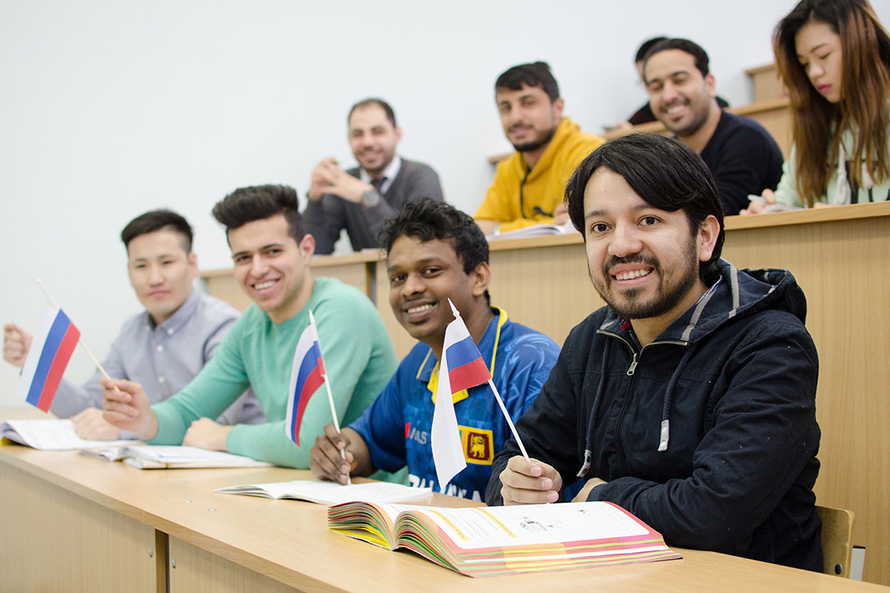During the year, the number of students from other countries in Russian universities increased by 17% and amounted to more than 242 thousand people. Learn more about what makes study in Russia so attractive to international students
High quality and reasonable price
Traditionally, Russian universities are popular in the CIS countries and the former post-Soviet space, as well as in India, Vietnam, China and most African countries. However, interest in Russian universities has been increasing in Europe in recent years.
Among the countries of the former USSR, prospective students from Kazakhstan are most interested in educational programs of Russian universities. There are more than 46 thousand Kazakh students.
Russia is also popular among prospective students from Uzbekistan, where 14 thousand students came to us. A little less citizens of Turkmenistan study in the Russian universities – 13.4 thousand, Ukraine – 12.3 thousand, China – 12 thousand.
International students in Russia prefer full-time education – the number of people willing to receive such kind of education increased by 17% in the past year, while the number of external students increased by only 6%.
In 2015, experts of the Center for Sociological Research conducted a survey among 3000 international students from 100 different Russian universities. The respondents had to answer the question why they decided to get a higher education in our country.
27% of respondents said they chose Russia because of a high level of education. The second most popular answer is the affordable tuition fee; this factor was indicated by 24% of international students.
Among other things, the references of family members, professors and colleagues, as well as the direction of the national Ministry of Education, influenced the choice of universities.
The feature is that, position of a university in world rankings including such authoritative ones as THE, QS and ARWU, makes less impact on the choice. Although every sixth student admits that, he looked through similar studies before deciding on the choice of the institution.
International postgraduate students are more often concerned about the position of the university in the world rankings, – about a quarter of them considered it while making a choice of a program.
Russian for foreigners
An important advantage of Russia is that there is an opportunity to get education without knowing the Russian language: you can go to the preparatory faculty for foreigners and take Russian course for one year that could be sufficient for training or choose a programme, which is taught in English.

Higher education in Russia
Russian higher education is gaining new frontiers, becoming stronger competitor to European universities. Only in a year the number of students from Europe in higher educational institutions of Russia increased by 40%, reaching 2.5 thousand people in 2015-2016 academic year.
Positions of higher education in Russia are also strengthening in the Asian market. The number of students from India increased by 20% – 5,300 people studied in Russian universities in the last academic year. "Growth" from China was 10%, reaching 12 thousand students. The majority of international students at the Far Eastern Federal University (FEFU) – about 70% – are the citizens of the PRC, which is explained by the geographical position of the university.
Education in Russia is also popular in Vietnam – 3.1 thousand Vietnamese citizens came to study in Russia. Students from African countries are always interested in Russian universities, their number increases annually. If in 2010-2011, about 7,000 people with the citizenship of African states received education in Russian universities, in 2013-2014 their number increased to 8,000, and in 2015-2016 there were already 11,000 people.
The popularity of Russia also increases the availability of educational scholarships for foreigners – the Government annually allocates 15,000 budget places in various Russian universities during the last few years.
According to the study of the Higher School of Economics (HSE) "Facts of Education", about 46% of full-time students from other countries did not pay for their studies in 2013-2014. In addition, 11.6% of foreigners received state scholarships, being full-time or external students and 5.4% of external students.

The Most Popular Professions
If a few years ago all international students often came to study in Moscow or in St. Petersburg, then nowadays universities in various regions of the country are gaining popularity.
In 2015, the Peoples' Friendship University of Russia (RUDN University), the St. Petersburg State University, and the St. Petersburg State Polytechnic University Peter the Great (SPbPU) became the leaders in the number of international students .
The top-10 includes the National Research Tomsk Polytechnic University (TPU), the Novosibirsk State Technical University and the Kazan (Privolzhsky) Federal University (KFU), the Kursk State Medical University and the Belgorod State National Research University.
For today about 40% of all international students study at 300 universities located in the Central Federal District, 130 of them are not located in Moscow.
They are followed by the North-West District, where more than 16% of foreigners study at 96 universities. Siberia closes the top three, where 91 universities accounting for about 13% of all international students receiving education in Russia.
In terms of major, foreigners are still interested in medicine, but the popularity of technical professions has also increased considerably. According to recent data, 22% of international students study engineering and technical majors, medical schools were chosen by 17% of international students and 16% have preferred to study economics and management.
The top 5 popular subjects also include Human and Social science and the major "Russian language" –they are studied by 12.2% and 11.8% of international students, respectively.
Thus, Russian universities are becoming more attractive for international students in both European and Asian countries. In addition to affordable prices and high quality of education, Russian universities offer more and more relevant programmes, which allows graduates to obtain a profession that is in demand on the labor market and promotes their further employment.



























































